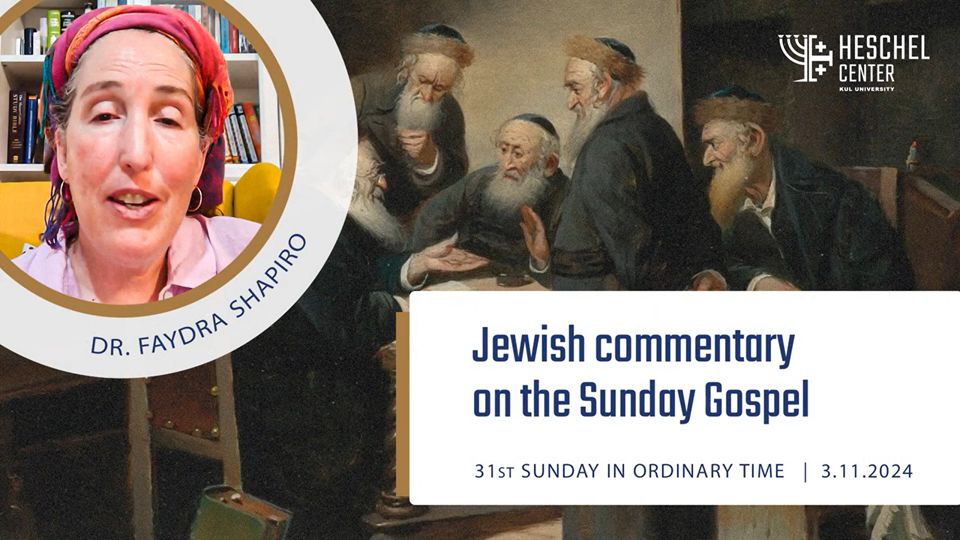Heschel Centre for Catholic-Jewish Relations at the Catholic University of Lublin
03 November, 2024
3 min
The Age-Old Question Goes: What Is Love?
Sunday Gospel

“As the Torah understands it, and clearly Jesus does too, love is not a feeling, it is a verb. It demands things from us. To love is a pledge of allegiance, a commitment expressed through concrete actions”, stresses Dr. Faydra Shapiro, Director of the Israel Center for Jewish-Christian Relations, in her commentary for the Catholic University of Lublin Heschel Center for the Sunday, November 3.
In today’s Gospel both of the commandments that Jesus quotes are straight from the Torah. The first, “And you shall love the Lord your God with all your heart, with all your soul and with all your might” comes from Deuteronomy chapter 6 and the second “You shall love your neighbor as yourself” comes from Leviticus 19. Obviously Jesus as a Jew immersed in Torah would have seen these as foundational and fundamental commandments.
But…as the age-old question goes: what is love?
Because to be perfectly honest, the Hebrew Bible is kind of ambivalent about human love. We have many, MANY examples where love has tragic results: Amnon loved Tamar, and it lead to sin. Shechem falls in love with Dina after he sins against her. Solomon’s love for his foreign wives leads him into idolatry. Samson’s love for Delilah leads to personal and national downfall. Michal’s love for David is manipulated and ends in bitterness and hatred. And Jacob’s love for Joseph leads to the brothers jealousy and attempted murder. In fact, there is only case of love between specific individuals that is presented positively: that of Jonathan for David.
What kinds of love go well in the Hebrew Bible? God’s love for the forefathers and for the nation of Israel are well attested in many places. But the only kind of human love that seems to “work” are these two cases: the commandment to love God and to love your neighbor, and one other that Jesus doesn’t quote: to love the stranger (Deut 10:19).
How can love be commanded? Doesn’t love just kind of happen? How does one command a feeling? Well, in short, one doesn’t. Because the love spoken of here for God and neighbor (and for the stranger) is not a feeling, but a demand for action. Our love for our husbands is expressed not only in feelings, or in words, but in picking up his socks. Our love for our parents is not just a feeling, it demands helping them out as they get older. Our love for our children is not just a feeling or words but requires playing yet another round of Scrabble with them.
As the Torah understands it, and clearly Jesus does too, love is not a feeling, it is a verb. It demands things from us. To love is a pledge of allegiance, a commitment expressed through concrete actions.
About the author:
Dr. Faydra Shapiro is a specialist in contemporary Jewish-Christian relations and is the Director of the Israel Center for Jewish-Christian Relations. She received the National Jewish Book Award for her first publication (2006). Her most recent book, with Gavin d’Costa, is Contemporary Catholic Approaches to the People, Land, and State of Israel. Dr. Shapiro is also a Senior Fellow at the Philos Project https://philosproject.org and a Research Fellow at the Center for the Study of Religions at Tel Hai College in Israel.
Related

Explaining Holy Week to Our Children: A Journey of Faith and Hope
Laetare
11 April, 2025
4 min

Christian Leadership in Business: A Model of Humility, Justice, and Solidarity
Javier Ferrer García
10 April, 2025
3 min

Guiding Our Decisions with God’s Will in Daily Life
Patricia Jiménez Ramírez
10 April, 2025
4 min

What are you going to do with your life?
Luis Herrera Campo
10 April, 2025
2 min
 (EN)
(EN)
 (ES)
(ES)
 (IT)
(IT)

